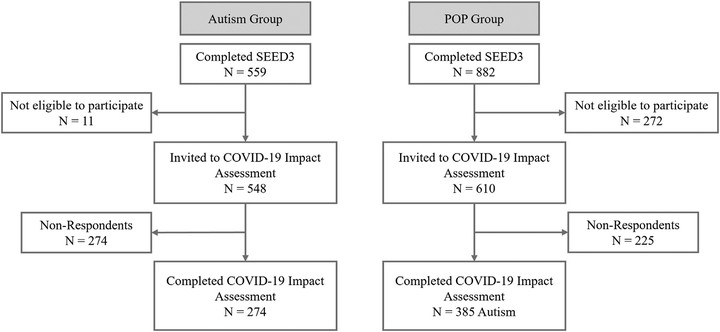
Abstract
Objective To test our initial hypotheses that the COVID-19 pandemic was associated with: (1) decreases in adaptive behavior and increases in behavioral and emotional problems of children with autism; (2) greater impacts for those who lost specialty services; and (3) greater behavioral and emotional problems for children with autism versus control participants. Method Eligible participants (N=1,158) enrolled in Phase 3 of the multi-site, case-control Study to Explore Early Development (SEED) prior to March 31, 2020, between 2-5 years old and completed follow-up assessments between January-July 2021. Caregivers completed a COVID-19 Impact Assessment Questionnaire, Vineland Adaptive Behavior Scales (VABS), and Child Behavior Checklist (CBCL) for 274 children with autism and 385 control participants. Results Mean VABS communication scores of children with autism decreased significantly (-4.2; standard deviation [SD], 10.5) between pre-pandemic and pandemic periods, while VABS composite (+2.0; SD, 9.0), daily living (+5.5; SD, 11.4), socialization (+2.3; SD, 10.0), and CBCL scores (-3.2; SD, 8.4) improved. In contrast, CBCL scores worsened in population control participants (+3.4; SD, 8.8). Children with autism who missed specialty appointments scored significantly lower on the VABS during the pandemic versus those who did not (VABS Composite 70.6; 95% confidence interval [CI]: 68.8-72.4 vs. 74.5; 95% CI: 71.8-77.2). Conclusion While stay-at-home policies of the pandemic may have beneficially impacted daily living skills, socialization, and behavioral and emotional wellbeing of children with autism, benefits may have occurred at the cost of communication skills. These findings indicate the need for strategies to maintain therapeutic services in future emergency settings.